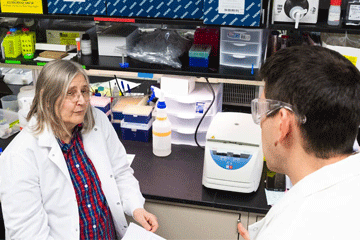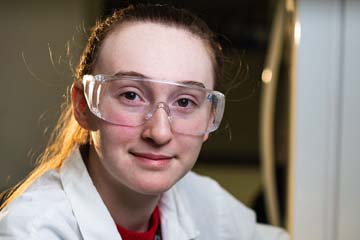Rossignol Research
Julien Rossignol, Ph.D., focuses his laboratory on innovative therapeutic approaches for neurodegenerative diseases, particularly Huntington’s disease (funded by NIH, R21-NS132089), Alzheimer’s disease, stroke, and glioblastoma. His research heavily involves the use of PAMAM dendrimer nanomolecules, which are specially engineered nanoparticles that can cross the blood-brain barrier and deliver therapeutic genes or drugs directly to brain cells.
Rossignol’s research also addresses neuroinflammation. His work involves using dendrimer nanomolecules to deliver anti-inflammatory agents, such as curcumin, which helps reduce the inflammatory response associated with cancer and neurodegeneration. This approach aims to minimize inflammation-driven damage, potentially reducing the spread of glioblastoma and aiding neuroprotection in conditions like Huntington’s disease.
Rossignol’s research extends to stroke recovery (funded by AHA-AIREA 18AIREA33990094), where his team explores the conversion of reactive astrocytes—cells that proliferate after a stroke—into functional neurons through gene delivery, using similar dendrimer-based techniques. This is aimed at promoting endogenous brain repair. His work in glioblastoma treatment involves encapsulating anti-inflammatory compounds like curcumin within dendrimers to enhance drug solubility and efficacy in targeting brain tumors.
Through his research, Rossignol aims to advance the treatment of neurodegenerative disorders by developing non-viral, highly efficient, and safer methods of gene and drug delivery to the brain.
View Julien Rossignol's publicationsOutreach and community events
Julien Rossignol, Ph.D., is actively involved in community outreach and mentorship, particularly within the realm of scientific education. Since joining Central Michigan University in 2007, he has supervised more than 30 graduate students and many more undergraduates in neuroscience, promoting scientific rigor and inspiring future researchers. Additionally, he engages in public outreach events to raise awareness about neurodegenerative diseases, including Huntington’s disease (HDSA, HDSA Walk), contributing to advocacy efforts and educating the public on the importance of research in developing new treatments (Brain Awareness Week, Brain Bee).
Rossignol is a frequent participant in national and international conferences focused on neurodegenerative diseases (president-elect of the American Society for Neural therapy and Repair, https://www.asntr.org/), nanomedicine, and regenerative therapies. He regularly attends conferences such as the Society for Neuroscience annual meeting, where he presents his research on gene therapy, dendrimer nanomolecules, and their applications in treating conditions like Huntington’s disease and stroke. He is the president of the Michigan Chapter of the Society for Neuroscience (https://www.mi-sfn.org/) . He also participates in specialized meetings that focus on gene editing technologies, neuroinflammation and nanotechnology in medicine, providing opportunities to collaborate with experts from other disciplines. His contributions at these conferences help advance discussions on innovative therapeutic approaches and foster interdisciplinary collaborations.
Links and resources
- CMU Training webpage.
- Student funding and resources.
- American Heart Association.
- Federation of European Neuroscience Societies.
- Institutional Animal Care and Use Committee.
- Institutional Biosafety Committee.
- Society for Neuroscience.
- Society for Neuroscience - Michigan Chapter.
Interested in joining?
Undergraduate and graduate students, post-baccalaureate and post-doctoral fellows: please contact Julien Rossignol.



